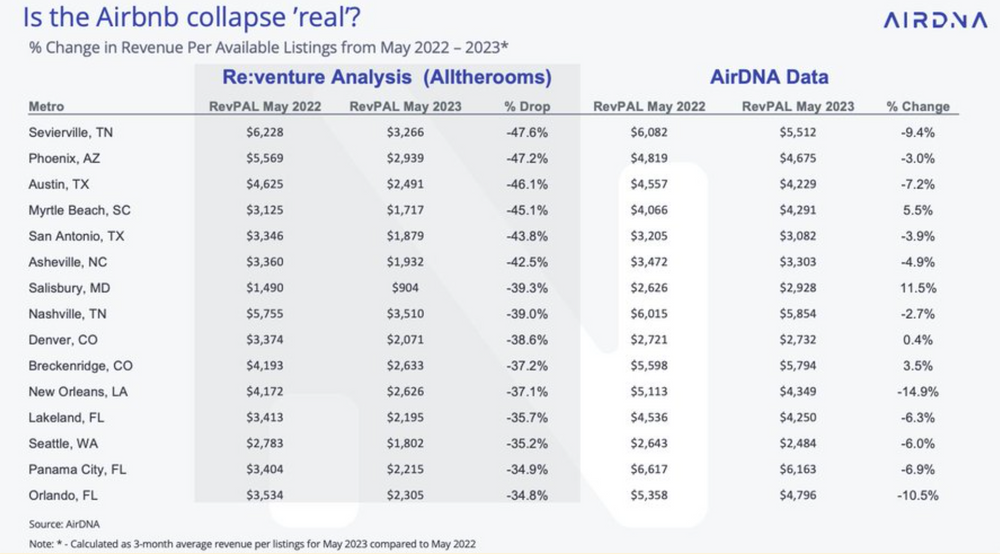There’s no doubt that occupancy rates are declining for Airbnb properties amid a supply increase, but whether we’re entering an Airbnb apocalypse or just seeing a heated market moderate depends on who you ask. Nick Gerli, CEO of Reventure Consulting, began a viral debate over the future of Airbnb revenue when he tweeted a chart based on data from short-term rental analytics firm Alltherooms, which depicted average revenue per listing falling up to 47.6% in some cities.
The Airbnb collapse is real.
Revenues are down nearly 50% in cities like Phoenix and Austin.
Watch out for a wave of forced selling from Airbnb owners later this year in the areas hit hardest by the revenue collapse. pic.twitter.com/xjGkj7bFC5
— Nick Gerli (@nickgerli1) June 27, 2023
Gerli suggested the trend would impact the housing market, inducing a “wave of forced selling from Airbnb owners” in the affected cities. But data from AirDNA, a competing short-term rental analytics firm, tells a different story.
For example, the company reported that the year-over-year change in three-month-average revenue for Sevierville, Tennessee, was -9.4%, compared to the -47.6% supported by data from Alltherooms. AirDNA data revealed the largest revenue decline of the cities in Gerli’s chart was in New Orleans, with a -14.9% drop, which was still a far cry from the -37.1% decrease in revenue shown from Alltherooms data.

What’s the True Airbnb Story?
It’s difficult to say with accuracy. Tax revenue reports from local governments are not readily available for 2023, and Airbnb Q1 2023 financial results aren’t broken down by city, leaving data from the two analytics firms as the best available estimate of what’s happening in these cities—and data from the two sources differ drastically.
To provide some context, we asked rental property management company Evolve to look at their internal data. “While it’s difficult to get a true apples-to-apples comparison of the data between all three sources with varying inputs and slightly different calculations, Evolve’s analysis most closely aligns with AirDNA,” says Eric Schueller, executive vice president of revenue at Evolve. “We see these changes in revenue as a normalization of the market coming off of the peaks in 2021 and 2022. This is not a market crash—2023 will still bring the most nights ever booked, and investing in a short-term [rental] still remains a sound long-term option for owners.”
Cities like Denver saw tax revenue from short-term rentals peak in 2022 as tourism recovered, but there was also a 21% year-over-year increase in short-term rental licenses in the city as of February 2023. Data from Airbnb and Evolve paint a similar picture—demand for rental properties is booming, and Airbnb had its most profitable first quarter on record, but the supply of available rentals also increased 18% when compared to the first quarter of 2022. New investors flocked to the short-term rental strategy during peak demand, and increased competition is putting pressure on average daily rates.
“Nationwide, both short-term rental market supply and demand are growing, with demand still hitting all-time highs,” says Schueller. “However, market supply growth is happening at a faster clip than market demand growth, causing total revenue per property to be down year over year.”
But while the short-term rental strategy may not be reaping the same peak profits for Airbnb hosts in 2023 as in previous years, that doesn’t mean vacation properties aren’t profitable. AirDNA data still shows occupancy rates well above 2019 and 2020 levels.
But success for short-term rental property owners is both market-dependent and property-dependent. In some cities, there’s too much competition to expect just any short-term rental property to flourish, but a showstopping property may still achieve high occupancy rates and revenues. In other cities, there may be enough demand to support new rentals. “We’ve seen revenue increase year over year for markets such as Mammoth Lakes, California, and Baltimore,” says Schueller.
AirDNA listed Fairbanks, Alaska, as the top city for Airbnb investors in 2023, where occupancy rates reach 65%, and properties earn an average of $49,000 annually in revenue. The city scored highly for rental demand, a metric based on combined occupancy and booked listing growth rates. Other cities on the list include Evansville, Indiana, and Rockford, Illinois.
A wave of new short-term rental ordinances in popular vacation destinations has also wiped out the potential for short-term rental investments in some of those areas, although most cities have not limited rentals for more than 30 days, meaning that the medium-term rental strategy is still viable. It’s also growing in popularity—there’s been more than a 30% increase in extended stays on Airbnb since 2019. Traveling professionals and digital nomads are using the platform to book rentals for a month or longer.
How Will Declining Revenues Impact Investors?
While data from various sources differ, the sentiment from experts at AirDNA, Airbnb, and Evolve is consistent: The market is normalizing rather than crashing. Hosts still stand to make more money now than they did in 2019, before the boom in demand for vacation rentals.
It’s possible the growth in supply will slow down as hosts on social media outlets issue warnings of #Airbnbust, potentially deterring newbie investors from jumping into the market. In some of the most impacted cities, investors who bought properties when mortgage rates were elevated may opt to sell due to falling occupancy rates and low-profit margins, which would affect the supply of vacation homes. If supply growth slows, it’s possible that falling revenues could plateau above 2019 levels rather than decline indefinitely.
Airbnb predicts a slowdown in bookings growth and a decrease in average daily rates in the second quarter when compared to last year during the post-pandemic vacation rental frenzy. AirDNA still forecasts demand growth and an increase in average daily rates for the remainder of 2023, but revenue per available rental is expected to decline.
If you’re looking to break into the short-term rental market, you should be very conscious of the available data for your market and always have a backup plan. There are several paid analytics platforms that can help you estimate the revenue potential for the markets you’re interested in, and Evolve can also provide guidance for would-be rental property investors.
With more competition, you’ll want to choose the optimal property as well as the right market, so gather local insights on the preferred amenities and number of bedrooms. Research other properties in the area, and make sure yours stands out from the pack. And in case you need to switch gears to remain profitable, calculate the expected revenue for the property in a medium-term or long-term rental scenario.
Schueller also has some advice for existing vacation rental property owners who are feeling the pain of decreased revenues, including:
- Set competitive rates: “Leveraging competitive rates adapted to today’s market is one of the best ways for owners to lock in harder-to-win bookings,” says Schueller. “Depending on a region’s activity, this could mean rates should be set differently from last month, last year, or even years past.” Note that listings with the lowest prices have the highest occupancy rates, according to Airbnb.
- Capture last-minute bookings: Schueller notes that more travelers were booking rentals last-minute over the spring break holiday. “Owners should also use booking trends to inform when to lower rates to capture interest from last-minute bookers and avoid having an empty property,” he says.
- Set a flexible cancellation policy: A Vrbo study revealed 77% of travelers would be more likely to book a vacation home with a flexible cancellation policy. Travelers can filter out properties without free cancellation, so choosing a flexible cancellation policy may get more eyes on your property. Vrbo data also shows more frequent bookings for properties with flexible cancellation policies.
- Collect great reviews: Airbnb data shows travelers are more likely to book a listing with a high star rating, so ensure you’re providing a great experience across categories: Provide an easy check-in process, maintain the property’s cleanliness, ensure your listing is accurate, and communicate promptly with guests.
- Consider getting help from a property manager: Managing a rental property in a competitive market can be overwhelming and may require more effort than you’re willing to put in. Says Schueller: “Ultimately, we find that vacation rental owners that manage their own properties are most successful when they treat their business like their full-time job, so for owners who are unable to dedicate that amount of time and energy, partnering with a property manager who already knows what success looks like is often the better option.”
The Bottom Line
The high revenue that short-term rental property investors captured in 2021 and 2022 may have been unsustainable—while plenty of people still want to travel, the new supply of properties brought by eager investors is driving down the average revenue for each host. It may be too early to tell whether a crash is underway, but most data sources seem to support a revision from the peak rather than a collapse. There’s still an opportunity for investors to profit from short-term rentals, according to Schueller, but it’s necessary to exercise caution, especially in oversaturated markets.
Get the Best Funding
Quickly find and compare investor-friendly lenders who specialize in your unique investing strategy. It’s fast, free, and easier than ever!
Note By BiggerPockets: These are opinions written by the author and do not necessarily represent the opinions of BiggerPockets.

